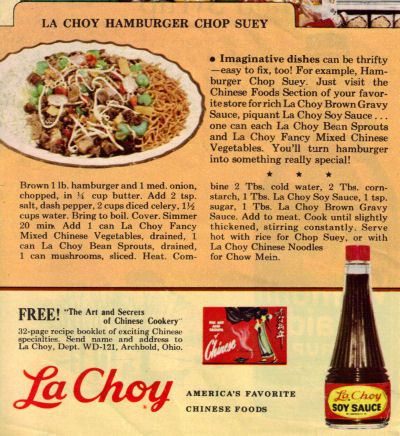
My family recently visited the newly opened
Museum of Chinese in America in New York City. It's excellent, chronicling the history of the Chinese in America from the California Gold Rush through the exclusion era and into today.
One of the more interesting sections was on Chinese food in America. For most of American history, Chinese couldn't own land and were formally or informally excluded from many businesses and professions. Restaurants, along with laundries, were one of the few businesses open to them.
Of course, the food they served often had only tenuous connections to China. Chop
Suey, for example, was invented in the United States. Chinese restaurants inevitably catered to the western preconceptions of the "exotic" and "mysterious" East: women in silk dresses embroidered with dragons, pagoda lanterns, smiling, obsequious wait staffs.
And then there was Chinese cooking at home, pioneered by companies like
LaChoy, founded in the 1920s by a white man and a Korean, but hey, is America. Their products included gut-wrenching chow mein in a can and frozen egg rolls.
The museum had a particularly frightening chop
suey recipe from the 1950s or 1960s like the one pictured above calling for sauteing hamburger and vegetables in butter and then adding noodles. It's as if someone irradiated Chinese food to produce grotesque mutations, the culinary
equivalent of a cow with three heads and one eye.
Let's not forget the marketing. I'm old enough to remember
this LaChoy "Swing American!" commercial from the late 1960s. Watching it, I can't decide whether to heave and cringe. Which is worse, the food or the stereotyping, borderline racism? Artifacts like these show how far we've come in the last 40 years.
As with so much, the 1970s were the turning point for Chinese Americans and Chinese cuisine in America. As barriers fell and stereotypes waned, people, at least on the coasts, became open to more authentic Chinese food. The days of
"ancient Chinese secret" are, thank God, gone (I remember this commercial too).

